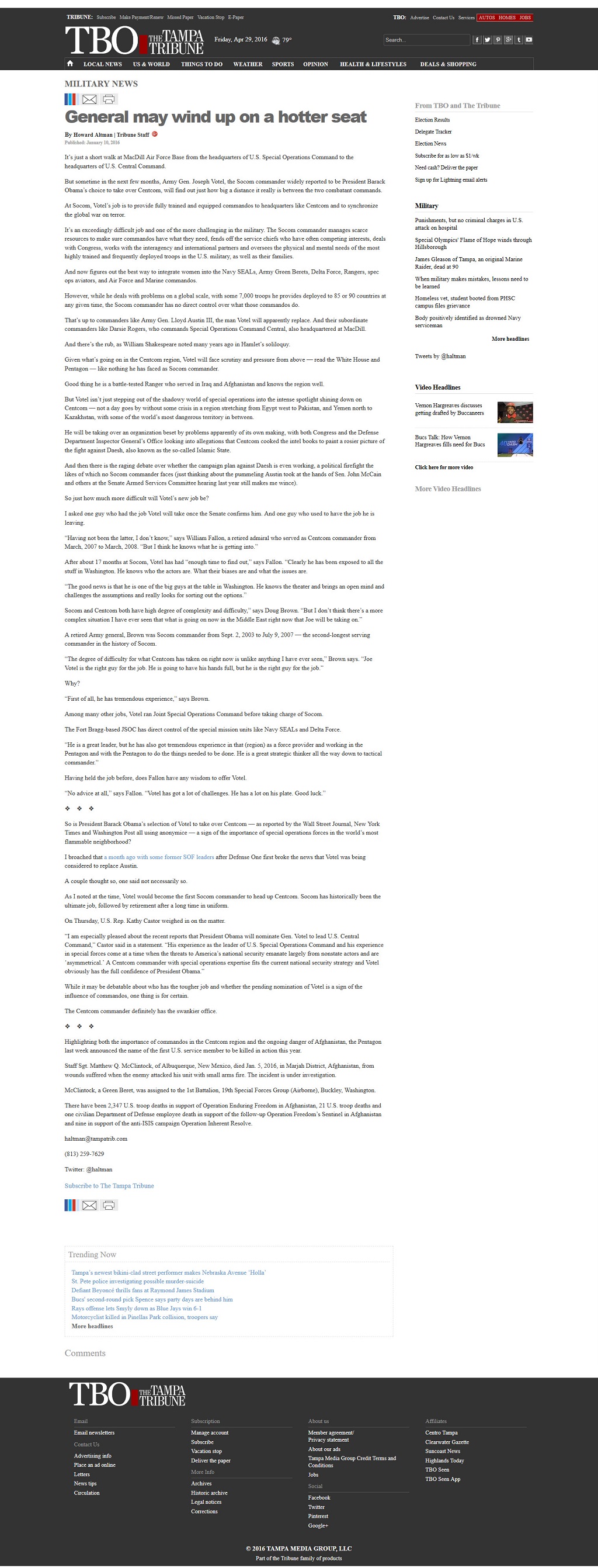The Tampa Tribune / TBO.com
Military News
It’s just a short walk at MacDill Air Force Base from the headquarters of U.S. Special Operations Command to the headquarters of U.S. Central Command.
But sometime in the next few months, Army Gen. Joseph Votel, the Socom commander widely reported to be President Barack Obama’s choice to take over Centcom, will find out just how big a distance it really is between the two combatant commands.
At Socom, Votel’s job is to provide fully trained and equipped commandos to headquarters like Centcom and to synchronize the global war on terror.
It’s an exceedingly difficult job and one of the more challenging in the military. The Socom commander manages scarce resources to make sure commandos have what they need, fends off the service chiefs who have often competing interests, deals with Congress, works with the interagency and international partners and oversees the physical and mental needs of the most highly trained and frequently deployed troops in the U.S. military, as well as their families.
And now figures out the best way to integrate women into the Navy SEALs, Army Green Berets, Delta Force, Rangers, spec ops aviators, and Air Force and Marine commandos.
However, while he deals with problems on a global scale, with some 7,000 troops he provides deployed to 85 or 90 countries at any given time, the Socom commander has no direct control over what those commandos do.
That’s up to commanders like Army Gen. Lloyd Austin III, the man Votel will apparently replace. And their subordinate commanders like Darsie Rogers, who commands Special Operations Command Central, also headquartered at MacDill.
And there’s the rub, as William Shakespeare noted many years ago in Hamlet’s soliloquy.
Given what’s going on in the Centcom region, Votel will face scrutiny and pressure from above — read the White House and Pentagon — like nothing he has faced as Socom commander.
Good thing he is a battle-tested Ranger who served in Iraq and Afghanistan and knows the region well.
But Votel isn’t just stepping out of the shadowy world of special operations into the intense spotlight shining down on Centcom — not a day goes by without some crisis in a region stretching from Egypt west to Pakistan, and Yemen north to Kazakhstan, with some of the world’s most dangerous territory in between.
He will be taking over an organization beset by problems apparently of its own making, with both Congress and the Defense Department Inspector General’s Office looking into allegations that Centcom cooked the intel books to paint a rosier picture of the fight against Daesh, also known as the so-called Islamic State.
And then there is the raging debate over whether the campaign plan against Daesh is even working, a political firefight the likes of which no Socom commander faces (just thinking about the pummeling Austin took at the hands of Sen. John McCain and others at the Senate Armed Services Committee hearing last year still makes me wince).
So just how much more difficult will Votel’s new job be?
I asked one guy who had the job Votel will take once the Senate confirms him. And one guy who used to have the job he is leaving.
“Having not been the latter, I don’t know,” says William Fallon, a retired admiral who served as Centcom commander from March, 2007 to March, 2008. “But I think he knows what he is getting into.”
After about 17 months at Socom, Votel has had “enough time to find out,” says Fallon. “Clearly he has been exposed to all the stuff in Washington. He knows who the actors are. What their biases are and what the issues are.
“The good news is that he is one of the big guys at the table in Washington. He knows the theater and brings an open mind and challenges the assumptions and really looks for sorting out the options.”
Socom and Centcom both have high degree of complexity and difficulty,” says Doug Brown. “But I don’t think there’s a more complex situation I have ever seen that what is going on now in the Middle East right now that Joe will be taking on.”
A retired Army general, Brown was Socom commander from Sept. 2, 2003 to July 9, 2007 — the second-longest serving commander in the history of Socom.
“The degree of difficulty for what Centcom has taken on right now is unlike anything I have ever seen,” Brown says. “Joe Votel is the right guy for the job. He is going to have his hands full, but he is the right guy for the job.”
Why?
“First of all, he has tremendous experience,” says Brown.
Among many other jobs, Votel ran Joint Special Operations Command before taking charge of Socom.
The Fort Bragg-based JSOC has direct control of the special mission units like Navy SEALs and Delta Force.
“He is a great leader, but he has also got tremendous experience in that (region) as a force provider and working in the Pentagon and with the Pentagon to do the things needed to be done. He is a great strategic thinker all the way down to tactical commander.”
Having held the job before, does Fallon have any wisdom to offer Votel.
“No advice at all,” says Fallon. “Votel has got a lot of challenges. He has a lot on his plate. Good luck.”
So is President Barack Obama’s selection of Votel to take over Centcom — as reported by the Wall Street Journal, New York Times and Washington Post all using anonymice — a sign of the importance of special operations forces in the world’s most flammable neighborhood?
I broached that a month ago with some former SOF leaders after Defense One first broke the news that Votel was being considered to replace Austin.
A couple thought so, one said not necessarily so.
As I noted at the time, Votel would become the first Socom commander to head up Centcom. Socom has historically been the ultimate job, followed by retirement after a long time in uniform.
On Thursday, U.S. Rep. Kathy Castor weighed in on the matter.
“I am especially pleased about the recent reports that President Obama will nominate Gen. Votel to lead U.S. Central Command,” Castor said in a statement. “His experience as the leader of U.S. Special Operations Command and his experience in special forces come at a time when the threats to America’s national security emanate largely from nonstate actors and are ‘asymmetrical.’ A Centcom commander with special operations expertise fits the current national security strategy and Votel obviously has the full confidence of President Obama.”
While it may be debatable about who has the tougher job and whether the pending nomination of Votel is a sign of the influence of commandos, one thing is for certain.
The Centcom commander definitely has the swankier office.
Highlighting both the importance of commandos in the Centcom region and the ongoing danger of Afghanistan, the Pentagon last week announced the name of the first U.S. service member to be killed in action this year.
Staff Sgt. Matthew Q. McClintock, of Albuquerque, New Mexico, died Jan. 5, 2016, in Marjah District, Afghanistan, from wounds suffered when the enemy attacked his unit with small arms fire. The incident is under investigation.
McClintock, a Green Beret, was assigned to the 1st Battalion, 19th Special Forces Group (Airborne), Buckley, Washington.
There have been 2,347 U.S. troop deaths in support of Operation Enduring Freedom in Afghanistan, 21 U.S. troop deaths and one civilian Department of Defense employee death in support of the follow-up Operation Freedom’s Sentinel in Afghanistan and nine in support

Original URL: http://www.tbo.com/list/military-news/general-may-wind-up-on-a-hotter-seat-20160110/

